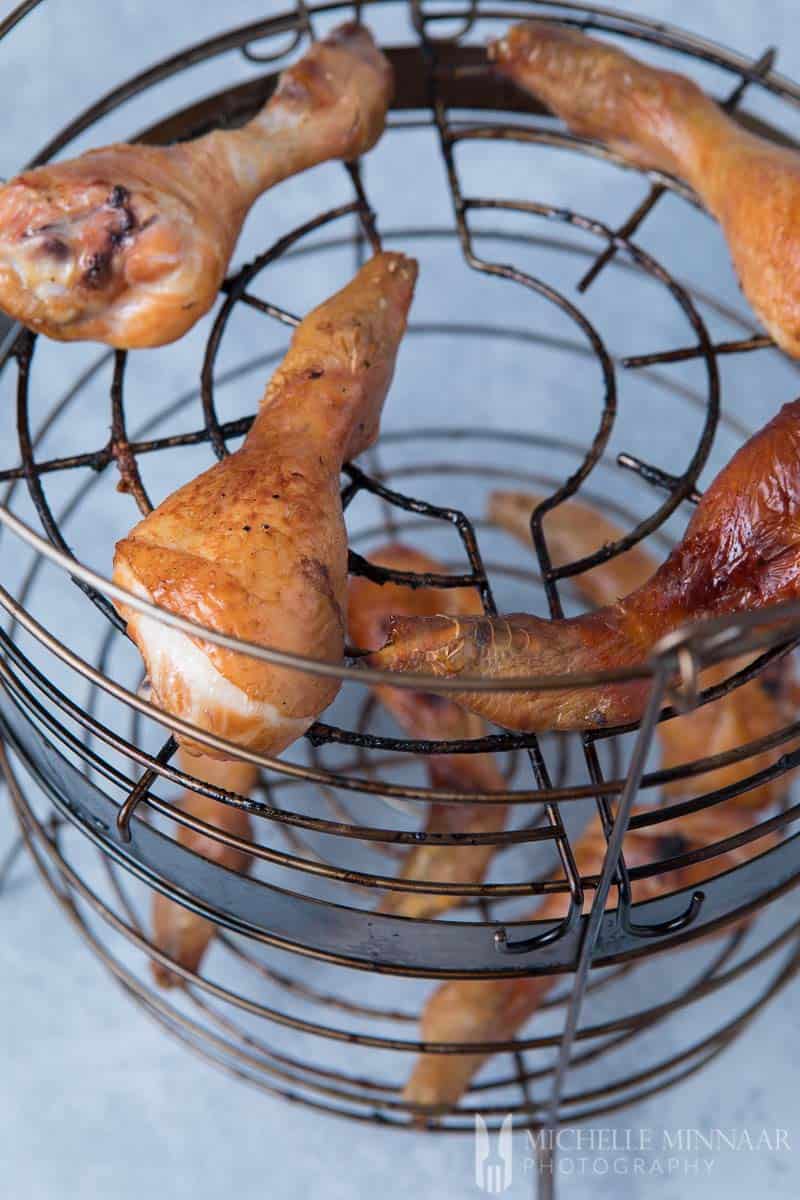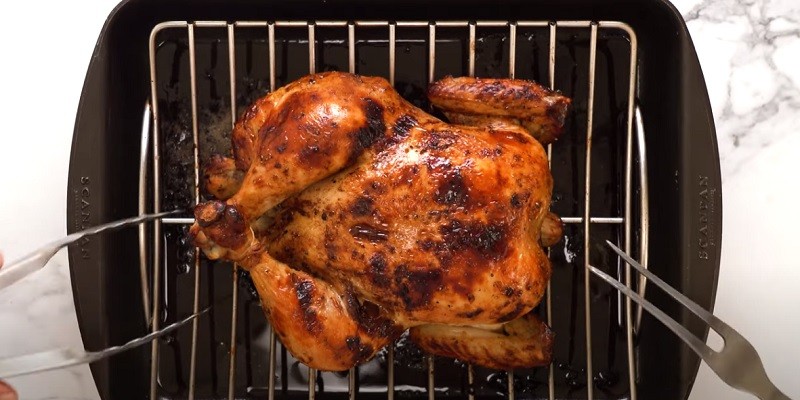Brining chicken for too long can make it too salty and affect the texture. It’s best to follow the recommended brining time for optimal results.
Brining is a common technique used to infuse chicken with flavor and moisture. By soaking the chicken in a saltwater solution, the meat becomes tender and flavorful. However, brining for too long can have negative effects. Over-brined chicken can become excessively salty and have a mushy texture.
It’s important to follow the recommended brining times to avoid these issues. We’ll explore the potential consequences of brining chicken for too long and provide guidance on how to properly brine chicken for delicious and succulent results.
The Basics Of Brining Chicken
When it comes to cooking chicken, brining is a technique that can take your dish to the next level. However, it’s important to understand the basics of brining chicken, including what it is, its purpose, and how it works. In this post, we’ll delve into the fundamentals of brining chicken to help you master this cooking method.
What Is Brining?
Brining is the process of soaking chicken in a saltwater solution before cooking. This technique helps to impart flavor and moisture to the meat, resulting in juicier and tastier chicken. The salt in the brine solution helps the chicken retain water, preventing it from drying out during the cooking process. In addition to salt, brines can also contain sugar, herbs, spices, and other flavorings to enhance the taste of the chicken.
The Purpose Of Brining
The primary purpose of brining chicken is to enhance its flavor and juiciness. The salt in the brine solution not only seasons the meat but also alters its protein structure, allowing it to retain more moisture during cooking. This leads to a more succulent and flavorful end result, especially when cooking lean cuts of chicken, such as chicken breasts. Brining can also help minimize the risk of overcooking, as the added moisture provides a buffer against dryness.
How Brining Works
Brining works through a process called osmosis, where the salt in the brine solution moves into the chicken meat, along with water. As a result, the cells of the chicken absorb the flavored liquid, leading to a juicier and more flavorful end product. The salt also denatures the proteins in the meat, allowing them to retain more water and preventing the muscle fibers from contracting excessively during cooking. This results in tender, moist, and well-seasoned chicken.
Factors Affecting Chicken Brining Time
When it comes to brining chicken, timing is crucial. Can you brine chicken too long? Absolutely. Over-brining can lead to overly salty and tough meat. The length of brining time is impacted by several factors, each playing a role in the final outcome of the brined chicken. By considering the type of brine solution, size and cut of chicken pieces, brining temperature, and understanding brining time limits, you can ensure perfectly brined chicken every time.
The Type Of Brine Solution
The type and concentration of the brine solution significantly affect the brining time. A higher salt concentration in the brine solution leads to a shorter brining time, while a lower concentration requires a longer brining period. Additionally, the flavors and additives in the brine solution can also impact the ideal brining time.
Size And Cut Of Chicken Pieces
The size and cut of the chicken pieces determine how quickly the brine solution penetrates the meat. Smaller pieces such as chicken wings or cutlets require less brining time compared to larger, whole cuts like a whole chicken or chicken breasts. Ensuring uniformity in size and thickness of the chicken pieces aids in consistent brining.
Brining Temperature
Brining temperature affects the rate at which the chicken absorbs the brine solution. Warmer temperatures expedite the brining process, while cooler temperatures slow it down. It is crucial to refrigerate the chicken as it brines to maintain a safe temperature and prevent bacterial growth.
Brining Time Limits
Brining chicken too long can result in an overly salty and unpleasant flavor. It’s essential to adhere to recommended brining times based on the type of brine solution, chicken pieces’ size, and brining temperature to achieve the desired flavor and texture without overdoing it.
Effects Of Over-brining Chicken
When it comes to brining chicken, the perfect balance is crucial. While brining chicken enhances its flavor and juiciness, overdoing it can lead to undesirable outcomes. Understanding the effects of over-brining chicken is essential for achieving the perfect balance of flavor and texture.
Texture And Moisture Changes
Over-brining chicken can result in a mushy texture and excessive moisture loss. When the chicken is left in the brine solution for too long, the salt begins to break down the protein structure, leading to a soft, overly tender texture that lacks the desired firmness.
Flavor Alterations
Over-brining chicken can cause the meat to become excessively salty, overpowering the intended flavors of the dish. The prolonged exposure to the brine solution can mask the natural taste of the chicken and result in an unappealing, overly salty flavor.
Health And Safety Concerns
Brining chicken for an extended period can raise food safety concerns, as the excessive time in the brine solution creates an environment conducive to bacterial growth. This may lead to foodborne illnesses if proper precautions are not taken.
Practical Tips For Avoiding Over-brining
- Use a brine solution with the proper salt-to-water ratio to prevent over-salting.
- Adhere to recommended brining times to avoid texture and flavor alterations.
- Ensure proper refrigeration during the brining process to minimize the risk of bacterial growth.
Optimal Brining Techniques And Guidelines
When it comes to achieving perfectly brined chicken, it’s crucial to understand the optimal brining techniques and guidelines. Proper brining enhances the flavor, juiciness, and tenderness of the meat, resulting in a delectable dining experience. Here, we delve into ideal brining times, recommended brine concentrations, and best practices for achieving perfectly brined chicken.
Ideal Brining Times For Different Cuts
Brining times can vary based on the type and size of the chicken cuts. Below is a general guideline for optimal brining times:
| Chicken Cut | Ideal Brining Time |
|---|---|
| Whole Chicken | 8-12 hours |
| Chicken Breasts | 1-2 hours |
| Thighs and Drumsticks | 2-4 hours |
Adjusting Brining Times For Enhanced Results
For enhanced flavor and juiciness, consider adjusting brining times based on personal preference. Brining chicken for a longer period than recommended can result in overly salty meat, so it’s important to strike the right balance.
Recommended Brine Concentrations
There are various brine recipes, but a common ratio is 1/4 cup of kosher salt to 4 cups of water. However, adjustments can be made based on personal taste preferences. Consider incorporating sugar, herbs, spices, and aromatics to customize the brine and enhance the flavor profile of the chicken.
Best Practices For Achieving Perfectly Brined Chicken
- Use a non-reactive container, such as a food-grade plastic or stainless steel, for brining.
- Ensure the chicken is fully submerged in the brine to achieve even seasoning.
- Refrigerate the chicken during brining to maintain food safety.
- After brining, rinse the chicken thoroughly to remove excess salt before cooking.

Credit: www.greedygourmet.com
Frequently Asked Questions Of Can You Brine Chicken Too Long?
Can You Brine Chicken Too Long?
Yes, over-brining can make the chicken too salty and mushy. Stick to recommended brining times for best results.
Is Brining Chicken Worth It?
Definitely! Brining adds flavor and moisture, resulting in juicier, more flavorful chicken.
How Long Should I Brine Chicken?
Aim for 1-2 hours for boneless, skinless cuts and 4-12 hours for whole birds. Check recipes for specifics.
What Happens If You Brine Chicken Too Long?
Over-brining can result in overly salty, unpleasantly soft, and less appetizing chicken.
Can You Brine Chicken Overnight?
Yes, but for whole chickens, it’s best to brine in the refrigerator for 8-12 hours to avoid over-brining.
Should I Rinse Brined Chicken Before Cooking?
Yes, rinse the brined chicken to remove excess salt on the surface before cooking for balanced flavor.
Conclusion
Brining chicken is a great way to infuse flavor and keep the meat juicy. However, brining too long can result in overly salty chicken. To avoid this, it’s important to follow recommended brining times and ratios. By understanding the process, you can ensure delicious, perfectly brined chicken every time.
Last Updated on April 23, 2025 by Pauline G. Carter

